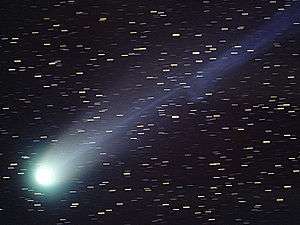84P/Giclas
| Discovery | |
|---|---|
| Discovered by | Henry L. Giclas |
| Discovery date | September 8, 1978 |
| Alternative designations |
1931 R1; 1978 R2; 1978 XXII; 1978k; 1985 M1; 1985 XV; 1985g; 1992 XXV |
| Orbital characteristics A | |
| Epoch | March 6, 2006 |
| Aphelion | 5.443 AU |
| Perihelion | 1.852 AU |
| Semi-major axis | 3.647 AU |
| Eccentricity | 0.4923 |
| Orbital period | 6.965 a |
| Inclination | 7.2810° |
| Last perihelion |
July 23, 2013[1] August 7, 2006 |
| Next perihelion | 2020-Jun-03[2] |
84P/Giclas is a periodic comet in the solar system. The comet nucleus is estimated to be 1.8 kilometers in diameter.[3]
On 11 June 2033 the comet will pass 0.0387 AU (5,790,000 km; 3,600,000 mi) from the asteroid 4 Vesta.[4]
References
- ↑ Syuichi Nakano (2010-04-09). "84P/Giclas (NK 1911)". OAA Computing and Minor Planet Sections. Retrieved 2012-02-18.
- ↑ "84P/Giclas Orbit". Minor Planet Center. Retrieved 2014-06-16.
- ↑ "JPL Small-Body Database Browser: 84P/Giclas" (2007-03-12 last obs). Jet Propulsion Laboratory. Retrieved 2012-02-18.
- ↑ "JPL Close-Approach Data: 84P/Giclas" (2007-03-12 last obs). Retrieved 2012-02-22.
External links
- Orbital simulation from JPL (Java) / Horizons Ephemeris
- 84P/Giclas – Seiichi Yoshida @ aerith.net
- 84P at Kronk's Cometography
| Numbered comets | ||
|---|---|---|
| Previous 83D/Russell |
84P/Giclas | Next 85P/Boethin |
This article is issued from Wikipedia - version of the 8/12/2016. The text is available under the Creative Commons Attribution/Share Alike but additional terms may apply for the media files.

